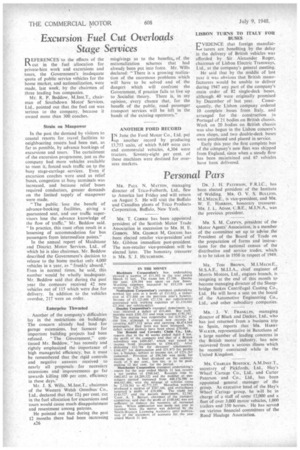Excursion Fuel Cut Overloads Stage Services R EFERENCES to the effects
Page 28

If you've noticed an error in this article please click here to report it so we can fix it.
of the cut in the fuel allocation for private-hire work and excursions and tours, the Government's inadequate quota of public service vehicles for the home market, and nationalization, were made, last week, by the chairmen of three leading bus companies.
Mr. R. P. Beddow, M.Inst.T., chairman of Southdown Motor Services, Ltd., pointed out that the fuel cut was serious to the company, because it owned more than 300 coaches, Strain on Manpower In the past the demand by visitors to coastal resorts for travel facilities to neighbouring resorts had been met, as far as possible, by advance bookings of excursions and tours. The curtailment of the excursion programme, just as the company had more vehicles available to meet it, forced such traffic on to the busy stage-carriage services. Even if excursion coaches were used as relief buses, congestion at busy terminals was increased, and because relief buses required conductors, greater demands on the limited supply of manpower were made.
"The public lose the benefit of advance-booking facilities, giving a guaranteed seat, and our traffic supervisors lose the advance knowledge of the flow of traffic," Mr. Beddow said. " In practice, this must often result in a lessening of accommodation for bus passengers from intermediate points."
In the annual report of Maidstone and District Motor Services, Ltd., of which he is also chairman, Mr. Beddow described the Government's decision to release to the home market only 4,000 vehicles in a year, as "frankly absurd." Even in normal times, he said, this numberwould be wholly inadequate. Mr. Beddow said that during the past year the company received 42 new vehicles out of 115 which were due for delivery. In addition to the vehicles overdue, 217 were on order.
Enterprise Thwarted
Another of the company's difficulties lay in the restrictions on buildings. The concern already had land for garage extensions, but licences for important building projects had been refused. "The Government," continued Mr. Beddow, "has recently and rightly emphasized the importance of high managerial efficiency, but it must be remembered that the rigid controls and negative answers received to nearly all proposals for necesgary extensions and improvements go far towards killing 100 per cent, efficiency in these days.7' Mr. J. S. Wills, M.Inst.T., chairman of the Western Welsh Omnibus. Co., Ltd., declared that the 12} per cent, cut in the fuel allocation for excursions and tours would cause much disappointment and resentment among patrons.
He pointed out that during the past 12 months there had been increasing A26 misgivings as to the benefits_ of the nationalization schemes that had already been put into force. Mr. Wills declared: "There is a growing realization of the enormous problems which will have to be solved and of the dangers which will confront the Government, if practice fails to live up to Socialist theory. There is, in my opinion, every chance that, for the benefit of the public, road passenger transport services will be left in the hands of the existing operators."
ANOTHER FORD RECORD fN June the Ford Motor Co., Ltd. put lup another record by producing 13,753 units, of which 9,449 were cars and commercial vehicles, 4,304 were tractors. Seventy-eight per cent, of these machines were destined for overseas markets. LISBON TURNS TO ITALY FOR BUSES VIDENCE that foreign manufacturers are benefiting by the delay in the delivery of British vehicles was afforded by Sir Alexander Roger, chairman of Lisbon Electric Tramways, Ltd., at the company's general meeting. He said that by the middle of last year it was obvious that British manufacturers would be unable to deliver during 1947 any part of the company's main order of 82 single-deck buses. although 40 were originally promised
by December of last year. Consequently, the Lisbon company ordered 10 complete buses from Italy, and arranged for the construction in Portugal of 21 bodies on British chassis. Work on 20 bodies on British chassis was also begun in the Lisbon concern's own shops, and two double-deck buses were purchased and placed in service.
Early this year the first complete bus of the coMpany's new fleet was shipped from England, since when a steady flow has been maintained and 67 vehicles have been delivered.




















































































